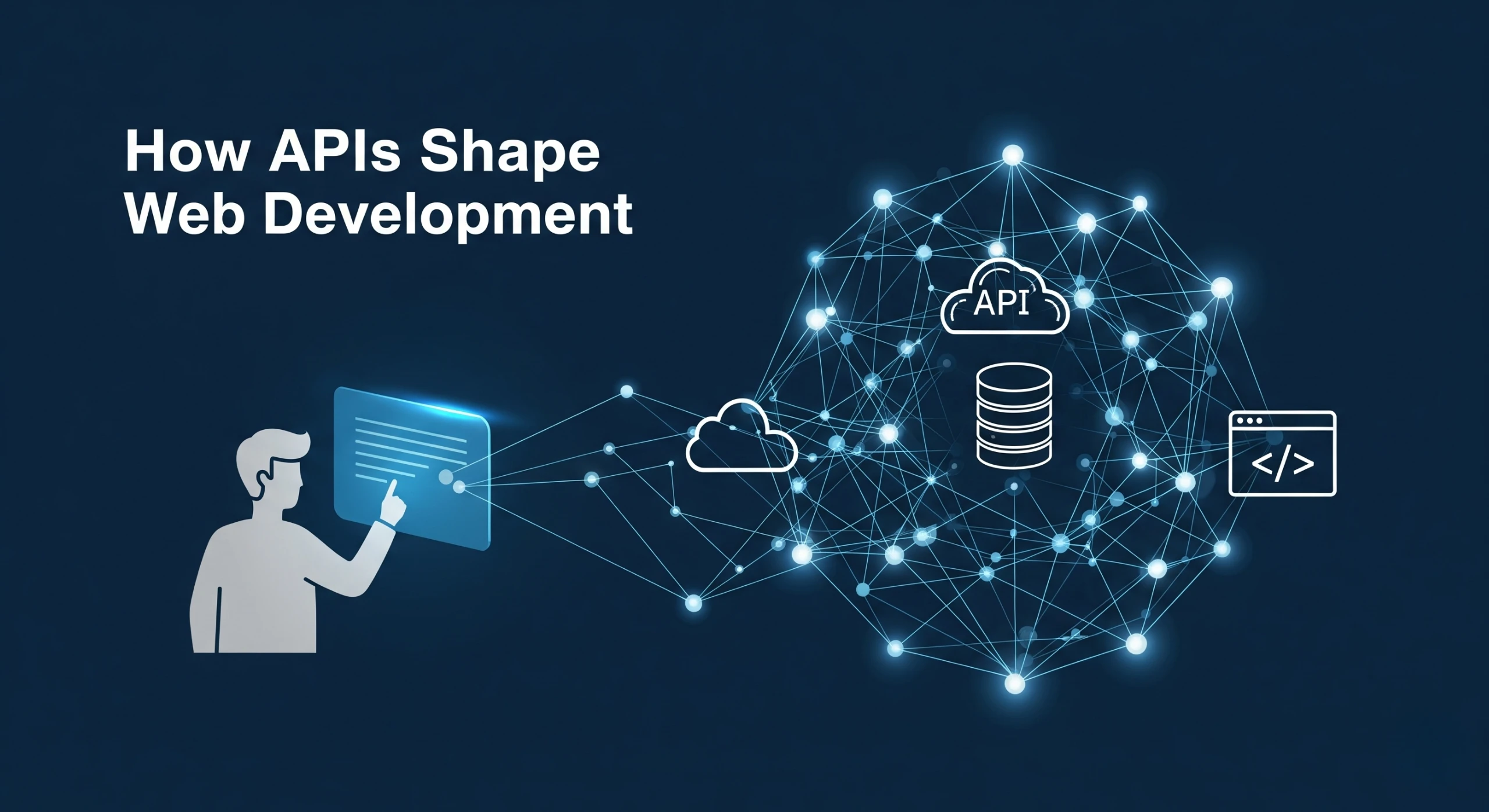The Role of APIs in Web Development: A Simple Guide for Today’s Digital World

In the ever-evolving world of technology, APIs in web development have become the silent engines powering most of what we do online. From booking a cab to ordering food, or even logging into your favourite social media platform APIs are working behind the scenes to make it all seamless.
But what exactly are APIs, and why are they so important in web development? Let’s dive into this world in a simple and engaging way.
What are APIs in Web Development?
API stands for Application Programming Interface. Think of it as a bridge that helps two different software systems talk to each other.
Imagine you’re ordering food from an app. You select a dosa, add a chutney combo, and hit “order”. The app then connects to the restaurant’s system to confirm availability, place the order, and initiate payment. All this communication is handled through APIs.
In web development, APIs make it possible for websites and applications to interact with other platforms, databases, and services without building everything from scratch. It saves time, increases efficiency, and opens doors to powerful features.
Why Are APIs Important in Web Development?
When we talk about modern websites and apps, users expect fast, responsive, and feature-rich experiences. APIs play a key role in meeting these expectations. Here’s how:
1. Speeding Up Development
Developers can plug into ready-made APIs instead of building complex functions from the ground up. Need a payment gateway? Use Razorpay or Stripe’s API. Want to embed Google Maps? There’s an API for that too.
2. Improved User Experience
APIs help websites run smoothly by integrating features like login with Google, real-time chat, or personalized recommendations. The result? A faster, smoother experience for the user.
3. Data Access & Integration
Need to pull data from external sources like weather forecasts or stock prices? APIs make it easy to fetch real-time data and show it on your website in seconds.
4. Better Scalability
As your business grows, APIs help you scale your web application without rewriting code. You can simply add new APIs to introduce new features and services.
Types of APIs in Web Development
Not all APIs are the same. Depending on their use and structure, we can divide them into a few common types:
1. REST APIs
These are the most common in web development. They use standard web protocols and are easy to use. They’re perfect for lightweight, scalable apps.
2. SOAP APIs
Older and more structured, SOAP APIs are used when security and detailed processes are essential, like in banking.
3. GraphQL APIs
These allow developers to request exactly the data they need no more, no less. They’re gaining popularity for their flexibility.
Real-Life Examples of APIs in Web Development
Let’s look at some everyday examples both from India and globally, to understand the role of APIs better:
1. Swiggy/Zomato
These food delivery platforms use multiple APIs for user authentication, real-time location tracking, restaurant data, payment gateways, and delivery updates.
2. IRCTC
Booking train tickets online involves using APIs for train schedules, seat availability, user login, and payment processing.
3. Netflix and YouTube
APIs help in delivering video content, managing user subscriptions, and recommending content based on your preferences.
4. E-commerce Platforms like Amazon or Flipkart
From product listing to payment and order tracking, every step is powered by APIs working silently behind the curtain.
Benefits of Using APIs in Web Development
If you’re still wondering why developers swear by APIs, here’s a quick list of their biggest benefits:
- Faster Development Time
- Cost-Effective
- Reliable Performance
- Secure Data Exchange
- Easier Maintenance
- Future-Proof Integration
All these perks lead to one thing a better digital experience for both the business and the end-user.
Challenges Developers Face with APIs in Web Development
Like anything in tech, APIs come with their own set of challenges:
1. Security Risks
If APIs aren’t implemented with the right security measures, they can become vulnerable points that hackers might exploit to access sensitive data or disrupt services. Just like leaving your main door unlocked, a poorly secured API can open the door to cyberattacks. That’s why it’s crucial to follow best practices like authentication, encryption, and regular testing.
2. Dependency on Third-Party Services
If a third-party API stops working, the features that depend on it – like payments, logins, or data fetching – can also stop working on your website or app. This can lead to a poor user experience, frustrated customers, and even potential revenue loss if the issue isn’t resolved quickly. It’s like one weak link affecting the entire chain.
3. Versioning Issues
APIs often go through updates to improve functionality or enhance security. If your code isn’t adjusted to match these changes, certain features might stop working or even break entirely. The good news is, with proper version control, regular testing, and the right development practices, these issues can be easily handled without disrupting your application..
How Developers Use APIs in Web Development Projects
Here’s a simple step-by-step of how developers typically work with APIs:
- Select the Right API – Based on the functionality needed.
- Read the Documentation – Understanding how the API works.
- Get API Keys – Used to authenticate your app.
- Make API Calls – Use GET/POST requests to send or fetch data.
- Handle Responses – Show relevant data or error messages on your website.
- Test & Monitor – Ensure it works smoothly under all conditions.
The Future of APIs in Web Development
APIs are not going anywhere. In fact, with AI, IoT, and cloud computing becoming mainstream, the need for powerful, flexible APIs is increasing.
For businesses, this means more opportunities to innovate without massive investments. For developers, it means building faster and smarter.
The demand for API-first development where APIs are designed before building the app is also on the rise.
Final Thoughts: APIs Are the Unsung Heroes of the Web
In today’s digital world, APIs in web development are like electricity. You don’t always see them, but they power almost everything.
From small startups to large enterprises, everyone is leveraging APIs to improve customer experience, streamline operations, and innovate faster.
If you’re building a digital product or planning to take your business online, having a solid API strategy is no longer optional it’s essential.
Want to make your web product API-ready?
Reach out to Ozrit we’ll help you build it right, from the ground up.
